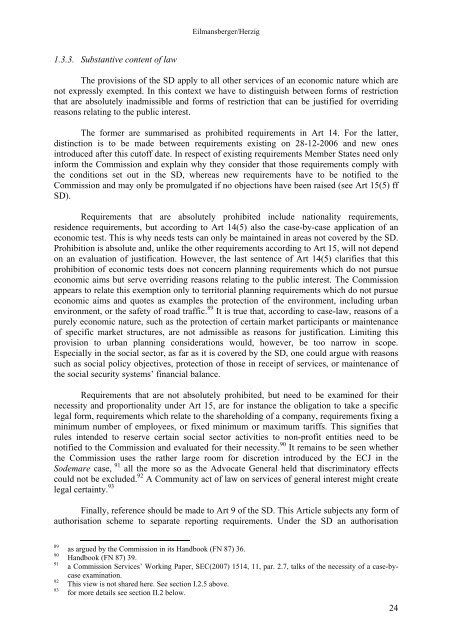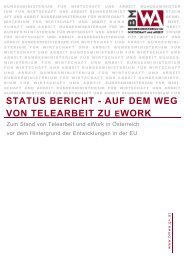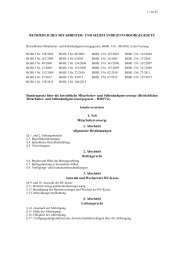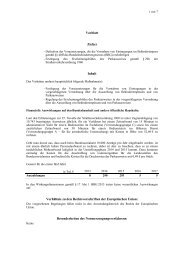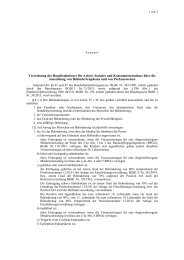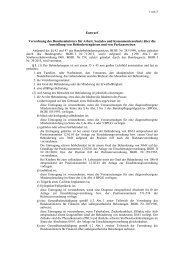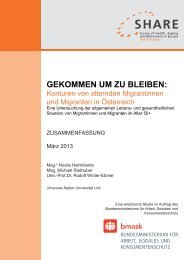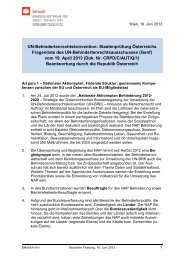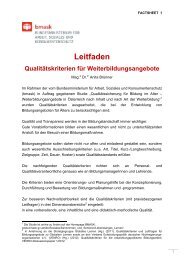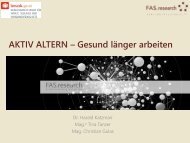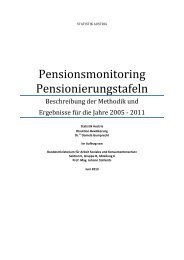Social Services of General Interest (SSGI)
Social Services of General Interest (SSGI)
Social Services of General Interest (SSGI)
Create successful ePaper yourself
Turn your PDF publications into a flip-book with our unique Google optimized e-Paper software.
1.3.3. Substantive content <strong>of</strong> law<br />
Eilmansberger/Herzig<br />
The provisions <strong>of</strong> the SD apply to all other services <strong>of</strong> an economic nature which are<br />
not expressly exempted. In this context we have to distinguish between forms <strong>of</strong> restriction<br />
that are absolutely inadmissible and forms <strong>of</strong> restriction that can be justified for overriding<br />
reasons relating to the public interest.<br />
The former are summarised as prohibited requirements in Art 14. For the latter,<br />
distinction is to be made between requirements existing on 28-12-2006 and new ones<br />
introduced after this cut<strong>of</strong>f date. In respect <strong>of</strong> existing requirements Member States need only<br />
inform the Commission and explain why they consider that those requirements comply with<br />
the conditions set out in the SD, whereas new requirements have to be notified to the<br />
Commission and may only be promulgated if no objections have been raised (see Art 15(5) ff<br />
SD).<br />
Requirements that are absolutely prohibited include nationality requirements,<br />
residence requirements, but according to Art 14(5) also the case-by-case application <strong>of</strong> an<br />
economic test. This is why needs tests can only be maintained in areas not covered by the SD.<br />
Prohibition is absolute and, unlike the other requirements according to Art 15, will not depend<br />
on an evaluation <strong>of</strong> justification. However, the last sentence <strong>of</strong> Art 14(5) clarifies that this<br />
prohibition <strong>of</strong> economic tests does not concern planning requirements which do not pursue<br />
economic aims but serve overriding reasons relating to the public interest. The Commission<br />
appears to relate this exemption only to territorial planning requirements which do not pursue<br />
economic aims and quotes as examples the protection <strong>of</strong> the environment, including urban<br />
environment, or the safety <strong>of</strong> road traffic. 89 It is true that, according to case-law, reasons <strong>of</strong> a<br />
purely economic nature, such as the protection <strong>of</strong> certain market participants or maintenance<br />
<strong>of</strong> specific market structures, are not admissible as reasons for justification. Limiting this<br />
provision to urban planning considerations would, however, be too narrow in scope.<br />
Especially in the social sector, as far as it is covered by the SD, one could argue with reasons<br />
such as social policy objectives, protection <strong>of</strong> those in receipt <strong>of</strong> services, or maintenance <strong>of</strong><br />
the social security systems’ financial balance.<br />
Requirements that are not absolutely prohibited, but need to be examined for their<br />
necessity and proportionality under Art 15, are for instance the obligation to take a specific<br />
legal form, requirements which relate to the shareholding <strong>of</strong> a company, requirements fixing a<br />
minimum number <strong>of</strong> employees, or fixed minimum or maximum tariffs. This signifies that<br />
rules intended to reserve certain social sector activities to non-pr<strong>of</strong>it entities need to be<br />
notified to the Commission and evaluated for their necessity. 90 It remains to be seen whether<br />
the Commission uses the rather large room for discretion introduced by the ECJ in the<br />
Sodemare case, 91 all the more so as the Advocate <strong>General</strong> held that discriminatory effects<br />
could not be excluded. 92 A Community act <strong>of</strong> law on services <strong>of</strong> general interest might create<br />
legal certainty. 93<br />
Finally, reference should be made to Art 9 <strong>of</strong> the SD. This Article subjects any form <strong>of</strong><br />
authorisation scheme to separate reporting requirements. Under the SD an authorisation<br />
89<br />
as argued by the Commission in its Handbook (FN 87) 36.<br />
90<br />
Handbook (FN 87) 39.<br />
91<br />
a Commission <strong>Services</strong>’ Working Paper, SEC(2007) 1514, 11, par. 2.7, talks <strong>of</strong> the necessity <strong>of</strong> a case-bycase<br />
examination.<br />
92<br />
This view is not shared here. See section I.2.5 above.<br />
93<br />
for more details see section II.2 below.<br />
24


